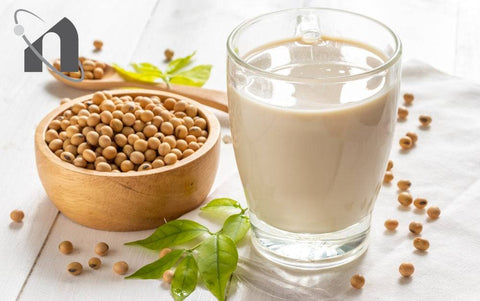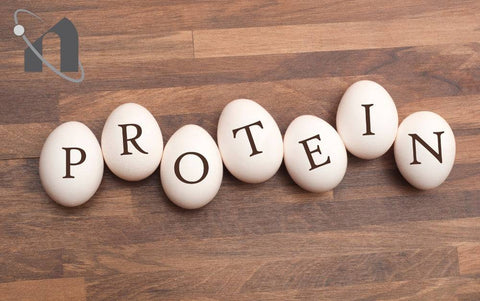Protein is an essential part of our diet, playing a vital role in muscle growth, recovery, and overall health. Whether you're an athlete, looking to lose weight, or just trying to maintain a healthy lifestyle, understanding different types of protein and how they benefit your body is crucial. In this guide, we'll explore various types of protein, their benefits, and how to incorporate them effectively into your routine.
"Fuel your body with the right protein to unlock your health and fitness potential."
What is Protein?
Protein is a macronutrient made up of amino acids that help build and repair tissues in the body. It's an important component for muscle, bones, enzymes, and even hormones. Protein supports a range of functions, from maintaining muscle mass to aiding immune health. It's found in many foods, such as dairy, meat, eggs, and plants like legumes and nuts.
"Proteins are the building blocks of life, providing essential nutrients needed for overall health."
The Role of Protein in the Body
- Muscle Growth and Repair: Protein is necessary for building and repairing muscles, making it crucial for both athletes and individuals engaging in regular physical activity.
- Enzyme and Hormone Production: Many enzymes and hormones in the body are proteins, essential for metabolic and physiological processes.
- Immune Function: Proteins are key components of antibodies, which help protect the body from infections and illnesses.
"Proteins are the building blocks of life, providing essential nutrients needed for overall health."
Protein Digestibility and Absorption Rates
The digestibility and absorption rate of protein are important factors to consider when choosing the right type:
- Whey Protein: Absorbed quickly, ideal for post-workout recovery when muscles need immediate nourishment.
- Casein Protein: Absorbed slowly, making it suitable for nighttime use to promote muscle repair during sleep.
- Egg Protein: Absorbed at a moderate rate, providing a balanced source of amino acids.
"Understanding the absorption rates of different proteins helps optimize their use for muscle growth and recovery."
Daily Protein Requirements
Daily protein requirements vary depending on age, activity level, and health goals. For adults, the recommended intake is around 0.8 grams per kilogram of body weight. Athletes or individuals engaging in intense exercise may need up to 2 grams per kilogram.
Note: Always consult a nutritionist for personalized protein recommendations.
Use our Protein Calculator to determine your daily protein needs based on your weight and activity level:
Different Types of Protein
Whey Protein

Whey protein is a complete protein derived from milk, containing all essential amino acids. It's well-known for its fast absorption, which is perfect for post-workout recovery.
"Whey protein is perfect for quick muscle recovery and growth, especially after an intense workout."
Casein Protein

Casein is another milk-derived protein that is absorbed more slowly, providing a steady release of amino acids. It is ideal for use before bedtime to support overnight muscle repair.
"Casein protein is your go-to for sustained muscle nourishment while you sleep."
Soy Protein

Soy protein is a plant-based protein that contains all essential amino acids. It's a great option for vegetarians and vegans, offering benefits like antioxidant properties due to isoflavones.
"Soy protein is a complete plant-based option for those avoiding dairy."
Egg Protein

Egg protein is a high-quality protein known for its digestibility and complete amino acid profile. It is suitable for those allergic to dairy.
"Egg protein offers a balanced release of amino acids, making it an excellent all-round choice."
Coparison Between Types of Protein
| Protein Type | Digestion & Absorption | Source | Benefits | Disadvantages | Uses |
|---|---|---|---|---|---|
| Whey Protein | Fast | Milk | Fast recovery, Muscle growth | May cause bloating in lactose intolerant individuals | Post-workout recovery, Muscle gain |
| Casein Protein | Slow | Milk | Sustained release, Overnight muscle repair | Slow digestion, Not ideal post-workout | Nighttime use, Muscle maintenance |
| Soy Protein | Moderate | Plant (Soybeans) | Plant-based, Contains all essential amino acids | Possible allergy risk, Lower bioavailability compared to dairy | General supplementation, Vegan/vegetarian diets |
| Egg Protein | Moderate | Eggs | Complete amino acid profile, Easily digestible | Allergic reactions in individuals sensitive to eggs | General supplementation, Muscle maintenance |
Choosing the Right Protein
Choosing the right type of protein depends on your dietary preferences, any food allergies, and your specific health and fitness goals. Whey protein is great for post-workout recovery, while casein is perfect for sustained release. Soy and egg proteins are excellent alternatives for those with dietary restrictions.
Note: Consider your health goals, allergies, and dietary preferences when selecting a protein supplement.
Conclusion
Protein is essential for muscle growth, repair, and overall health. Whether you choose whey, casein, soy, or egg protein, each type offers unique benefits that can support your fitness journey. Make informed choices based on your needs, and enjoy the benefits of this powerful macronutrient.
"Optimize your nutrition with the right protein, and fuel your body for success."
FAQs
What is the best protein for muscle growth?
Whey protein is considered the best for muscle growth due to its fast absorption and high leucine content.
Is casein better than whey?
Casein is better for sustained release, making it ideal before sleep, while whey is better for quick post-workout recovery.
Can vegans take protein supplements?
Yes, soy protein is a complete plant-based protein suitable for vegans.
How much protein do I need daily?
For most adults, 0.8 grams per kilogram of body weight is sufficient. Athletes may need more, up to 2 grams per kilogram.
Can I take protein if I'm lactose intolerant?
Yes, soy protein and egg protein are good alternatives for those who are lactose intolerant.
Takeaways
- Protein is essential for muscle growth, weight loss, and overall health.
- Different types of protein have different absorption rates and benefits.
- Whey, casein, soy, and egg proteins all serve different purposes based on your fitness goals.
- Daily protein needs vary; consult a nutritionist for personalized advice.
References
- Protein – The Nutrition Source - Harvard T.H. Chan School of Public Health - Information on different protein sources and their health impacts.
- The Power of Protein - The American Journal of Clinical Nutrition - A comprehensive study on protein's role in human nutrition.



Leave a comment
All comments are moderated before being published.
This site is protected by hCaptcha and the hCaptcha Privacy Policy and Terms of Service apply.